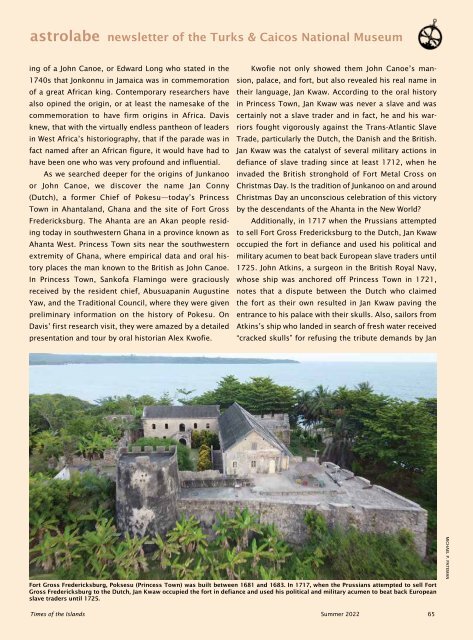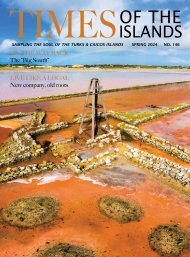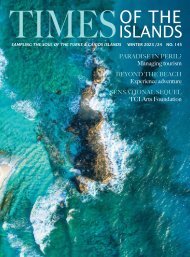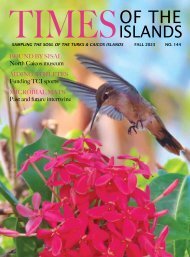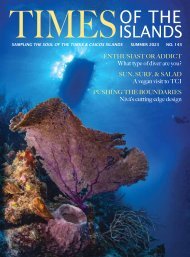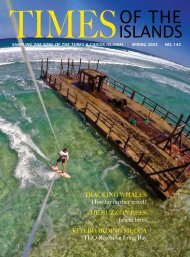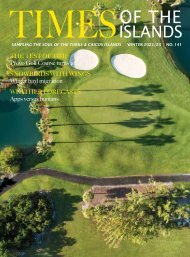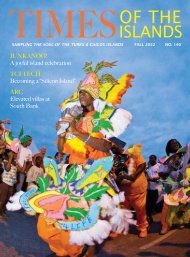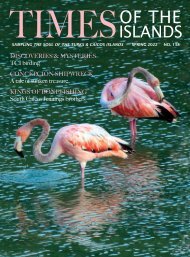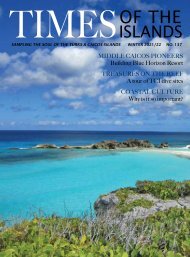Times of the Islands Summer 2022
Presents the "soul of the Turks & Caicos Islands" with in-depth features about local people, culture, history, environment, real estate, businesses, resorts, restaurants and activities.
Presents the "soul of the Turks & Caicos Islands" with in-depth features about local people, culture, history, environment, real estate, businesses, resorts, restaurants and activities.
You also want an ePaper? Increase the reach of your titles
YUMPU automatically turns print PDFs into web optimized ePapers that Google loves.
astrolabe newsletter <strong>of</strong> <strong>the</strong> Turks & Caicos National Museum<br />
ing <strong>of</strong> a John Canoe, or Edward Long who stated in <strong>the</strong><br />
1740s that Jonkonnu in Jamaica was in commemoration<br />
<strong>of</strong> a great African king. Contemporary researchers have<br />
also opined <strong>the</strong> origin, or at least <strong>the</strong> namesake <strong>of</strong> <strong>the</strong><br />
commemoration to have firm origins in Africa. Davis<br />
knew, that with <strong>the</strong> virtually endless pan<strong>the</strong>on <strong>of</strong> leaders<br />
in West Africa’s historiography, that if <strong>the</strong> parade was in<br />
fact named after an African figure, it would have had to<br />
have been one who was very pr<strong>of</strong>ound and influential.<br />
As we searched deeper for <strong>the</strong> origins <strong>of</strong> Junkanoo<br />
or John Canoe, we discover <strong>the</strong> name Jan Conny<br />
(Dutch), a former Chief <strong>of</strong> Pokesu—today’s Princess<br />
Town in Ahantaland, Ghana and <strong>the</strong> site <strong>of</strong> Fort Gross<br />
Fredericksburg. The Ahanta are an Akan people residing<br />
today in southwestern Ghana in a province known as<br />
Ahanta West. Princess Town sits near <strong>the</strong> southwestern<br />
extremity <strong>of</strong> Ghana, where empirical data and oral history<br />
places <strong>the</strong> man known to <strong>the</strong> British as John Canoe.<br />
In Princess Town, Sank<strong>of</strong>a Flamingo were graciously<br />
received by <strong>the</strong> resident chief, Abusuapanin Augustine<br />
Yaw, and <strong>the</strong> Traditional Council, where <strong>the</strong>y were given<br />
preliminary information on <strong>the</strong> history <strong>of</strong> Pokesu. On<br />
Davis’ first research visit, <strong>the</strong>y were amazed by a detailed<br />
presentation and tour by oral historian Alex Kw<strong>of</strong>ie.<br />
Kw<strong>of</strong>ie not only showed <strong>the</strong>m John Canoe’s mansion,<br />
palace, and fort, but also revealed his real name in<br />
<strong>the</strong>ir language, Jan Kwaw. According to <strong>the</strong> oral history<br />
in Princess Town, Jan Kwaw was never a slave and was<br />
certainly not a slave trader and in fact, he and his warriors<br />
fought vigorously against <strong>the</strong> Trans-Atlantic Slave<br />
Trade, particularly <strong>the</strong> Dutch, <strong>the</strong> Danish and <strong>the</strong> British.<br />
Jan Kwaw was <strong>the</strong> catalyst <strong>of</strong> several military actions in<br />
defiance <strong>of</strong> slave trading since at least 1712, when he<br />
invaded <strong>the</strong> British stronghold <strong>of</strong> Fort Metal Cross on<br />
Christmas Day. Is <strong>the</strong> tradition <strong>of</strong> Junkanoo on and around<br />
Christmas Day an unconscious celebration <strong>of</strong> this victory<br />
by <strong>the</strong> descendants <strong>of</strong> <strong>the</strong> Ahanta in <strong>the</strong> New World?<br />
Additionally, in 1717 when <strong>the</strong> Prussians attempted<br />
to sell Fort Gross Fredericksburg to <strong>the</strong> Dutch, Jan Kwaw<br />
occupied <strong>the</strong> fort in defiance and used his political and<br />
military acumen to beat back European slave traders until<br />
1725. John Atkins, a surgeon in <strong>the</strong> British Royal Navy,<br />
whose ship was anchored <strong>of</strong>f Princess Town in 1721,<br />
notes that a dispute between <strong>the</strong> Dutch who claimed<br />
<strong>the</strong> fort as <strong>the</strong>ir own resulted in Jan Kwaw paving <strong>the</strong><br />
entrance to his palace with <strong>the</strong>ir skulls. Also, sailors from<br />
Atkins’s ship who landed in search <strong>of</strong> fresh water received<br />
“cracked skulls” for refusing <strong>the</strong> tribute demands by Jan<br />
Fort Gross Fredericksburg, Poksesu (Princess Town) was built between 1681 and 1683. In 1717, when <strong>the</strong> Prussians attempted to sell Fort<br />
Gross Fredericksburg to <strong>the</strong> Dutch, Jan Kwaw occupied <strong>the</strong> fort in defiance and used his political and military acumen to beat back European<br />
slave traders until 1725.<br />
MICHAEL P. PATEMAN<br />
<strong>Times</strong> <strong>of</strong> <strong>the</strong> <strong>Islands</strong> <strong>Summer</strong> <strong>2022</strong> 65


